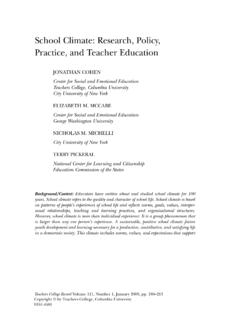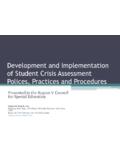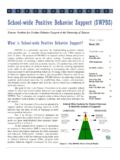Transcription of School Climate Practices for Implementation and Sustainability
1 School Climate PRACTICE BRIEFS, No. 1, 2013 School Climate Practices for Implementation and Sustainability Teri Dary and Terry Pickeral Table of Contents Preface by Teri Dary & Terry Pickeral .. 3 School Climate and Standards ..9 Patricia A. Ciccone, Superintendent, Westbrook, CT Public Schools Jo Ann Freibeg, Education Consultant, CT State Department of Education School Climate and Amrit Thapa, Research Director, National School Climate Center School Climate Measurement and Darlene Faster, Chief Operating Officer and Director of Communications, National School Climate Center Daisy Lopez, Marketing and School Support Manager, National School Climate Center School Climate and Youth Richard Cardillo, Education Director, National School Climate Center School Climate and Shared Leadership.
2 26 William H. Hughes, Director of Leadership, Schools That Can Milwaukee and Director of the School and Instructional Leadership Program, Alverno College, Milwaukee, Wisconsin. Terry Pickeral, Senior Consultant , National School Climate Center School Climate and Moral and Social Richard Weissbourd, Lecturer on Education Suzanne M. Bouffard, Prevention Science and Practice Program Project Manager Stephanie M. Jones, Associate Professor in Human Development and Urban Education Advancement, Making Caring Common Initiative, Harvard Graduate School of Education School Climate and Clement Coulston, Special Olympics Project UNIFY and Student, University of Delaware Kaitlyn Smith Special Olympics Project UNIFY and Student, University of Northern Colorado School Climate and Randy Ross, New England Equity Assistance Center, The Education Alliance at Brown University School Climate and Dropout Marty Duckenfield, Public Information Officer, Beth Reynolds, Executive Director.
3 National Dropout Prevention Center School Climate and Bullying Jonathan Cohen, President, National School Climate Center and Adjunct Professor in Psychology and Education, Teachers College, Columbia University Jo Ann Freiberg, Connecticut State Department of Education and Member, National School Climate Council School Climate and Adult Jonathan Cohen, President, National School Climate Center and Adjunct Professor in Psychology and Education, Teachers College, Columbia University Philip Brown, Senior Consultant, National School Climate Center 2013 National School Climate Center, NYC - Photocopying for nonprofit educational purposes is permitted.
4 Printed in the United States of America . Suggested citation for this document: Dary, T. & Pickeral, T. (ed) (2013). School Climate : Practices for Implementation and Sustainability . A School Climate Practice Brief, Number 1, New York, NY: National School Climate Center. 3 NATIONAL School Climate CENTER (NSCC) Educating minds and hearts, because the Three Rs are not enough School Climate PRACTICE BRIEFS FOR Implementation AND Sustainability Preface The National School Climate Center (NSCC) School Climate Practice Briefs for Implementation and Sustainability present the latest in research and best practice for effective School Climate reform from leading experts.
5 The 11 issues selected to be included in this set of Practice Briefs are based on NSCC s decade-long work with the entire academic community teachers, staff, School -based mental health professionals, students and parents to improve a Climate for learning. NSCC translates research into practice by establishing meaningful and relevant guidelines, programs and services that support a model for whole School improvement with a focus on School Climate . School Climate refers to the quality and character of School life. School Climate is based on patterns of students', parents' and School personnel's experience of School life and reflects norms, goals, values, interpersonal relationships, teaching and learning Practices , and organizational structures.
6 A sustainable, positive School Climate fosters youth development and learning necessary for a productive, contributing and satisfying life in a democratic society. NSCC suggests that there are four major areas to organize School Climate improvement: safety, relationships, teaching and learning, and the external environment. We encourage readers to review all of the School Climate Practice Briefs for Implementation and Sustainability to understand the comprehensive nature of School Climate . The Briefs are organized to provide the reader with a foundation on School Climate standards, research, and measurement and analysis followed by demonstrations of the alignment of School Climate with critical education issues.
7 Each Brief provides an overview of the topic followed by specific Practices individuals, schools and communities can take to ensure School Climate is a critical component of School Practices , responsibilities and accountability. School Climate Practice Briefs for Implementation and Sustainability Overview Standards: This Brief demonstrates how the National School Climate Standards provide a research-based framework and benchmark criteria for educational leaders ( School Boards, State Departments of Education, Superintendents, Principals and After School leaders) to support and assess district and School efforts to enhance and be accountable for School Climate .
8 It also provides guidance for professional preparation and continuing education, personally and systemically. 4 As with most standards, the National School Climate Standards do not recommend or detail specific assessment, curriculum, leadership, professional development, and related systemically informed programs, curricula, or services. Each state and/or School community must consider how best to translate these standards into practice in ways that build on past experiences, values, strengths, priorities, and contextual needs of the local School community. There are five standards (including 16 indicators) by which School Climate efforts and their outcomes will be measured.
9 Suggested Practices include: Raise awareness and support around the Standards. Ensure the Board of Education formally adopts the Standards. Plan and conduct School Climate training for all School community members. Research, develop/source and implement School Climate assessments. Create and implement School Climate improvement action plans. Research: This Brief demonstrates that School Climate matters. Research shows that sustained positive School Climate is associated with positive child and youth development, effective risk prevention and health promotion efforts, student learning and academic achievement, increased student graduation rates, and teacher retention.
10 A set of corresponding Practices encourage (1) School Climate efforts to be built on existing research and (2) schools to collect and analyze their School s data to establish a baseline and measure enhancements: Engage all stakeholders as active participants and agents of change. Focus on long-term programming, impacts, infrastructure and support. Create School networks to share best Practices and discuss challenges. Engage students at all stages of the process to build capacity and sustain reform efforts. Create and share tools and information with teachers, administrators, staff and parents. Establish a School Climate policy agenda to support quality Practices built on research.








